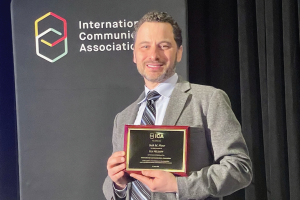Seth Noar named ICA Fellow

By Beth Hatcher
Leading health communication scholar and UNC Hussman Professor Seth Noar was named an ICA Fellow at the recent 2023 International Communication Association Conference in Toronto May 25-29, 2023.
The honor recognizes distinguished scholarly achievement and contributions to the broad field of communication.
Candidates are nominated by ICA members and must receive a majority vote from current Fellows and approval by the organization’s Board of Directors.
“Becoming an ICA Fellow is a major career honor. It’s the sort of thing where you look back 20 years after starting in the profession and realize that the work you have been doing isn’t just a bunch of studies, but has amounted to a significant contribution to our field,” said Noar, the school’s James Howard and Hallie McLean Parker Distinguished Professor. “Even more than prior awards which have been exciting in their own right, this is a real milestone in my career, and I’m humbled and honored to have achieved it.”
Noar joined UNC Hussman in 2011 and is also a member of UNC’s Lineberger Comprehensive Cancer Center.
His work has spanned many areas in health communication, with a particular focus on message effects, communication campaigns and policy-relevant communication approaches.
“Seth is renowned nationwide as a scholar, teacher, mentor and thought leader in the critically important and impactful field of health communication,” said UNC Hussman Dean Raul Reis. “Earning the distinction of being an ICA Fellow is a very high honor — and one that Seth richly deserves.”
Over his career, Noar has advanced the field’s understanding of message targeting and tailoring approaches and he has conducted extensive research on the effectiveness of tobacco prevention and control messages. His work on pictorial cigarette pack warnings has been cited by the FDA in their rulemaking, and his work on perceived message effectiveness ratings has provided researchers and campaign designers with new theoretical insights and measures to assess the potential effectiveness of health messages.
Noar has also conducted more than 25 systematic reviews and meta-analyses in health communication, including the first meta-analyses of print tailored messaging interventions, computer-based interventions for HIV prevention, use of text messaging for health promotion, and pictorial cigarette pack warnings. He has co-edited four books or journal special issues and has published more than 250 peer-reviewed articles and chapters, including in HIV/STD prevention, cancer communication and tobacco control.
He has been a funded investigator on more than $35 million in grants from the NIH and FDA and a principal investigator on multiple NIH Research Project Grants.
“Research is a team sport, and I could not have made a mark on my field without the many incredible students, staff, and faculty collaborators whom I have worked with. And with the NIH and FDA funding we have been able to bring to UNC and our school, we are increasingly funding talented students and postdoctoral researchers to work on projects together,” Noar said. “Mentoring students and postdocs while conducting meaningful health communication work — both inside and outside of the classroom — continues to be very rewarding.”
In 2021, Noar launched the Communicating for Health Impact (CHI) Lab at UNC Hussman, which produces health communication research promoting public health while serving as a research hub that can help UNC Hussman recruit some of the best and brightest health communication minds.
For Noar, he imagines a future in which he hopes to continue seeing the CHI lab’s work have an impact on health practices in the real world.
“I’m excited about continuing to build the lab, bring talented students and postdocs here to work with us on research projects, and disseminate what we are finding to diverse audiences,” Noar said. “To me, it’s exciting to do meaningful work, get it published and contribute to the science — and that’s a key accomplishment. But impact should go beyond that since our true goal, in my view, is to impact practice and policy. I can’t wait to see what the next decade brings.”